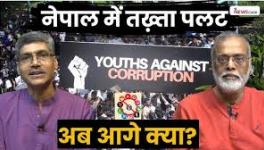After months of petty mindedness, crass oneupmanship and the impossibility of forming a national consensus government, a Communist Party of Nepal (United Marxist-Leninist) leader has been elected to the role of prime ministership in Nepal in a two round process. UML chairman Jhalanath Khanal was supported by the Maoists in his bid to become the premier, marking an end to a tortuous process of electing a new prime minister after UML leader Madhav Kumar Nepal resigned as part of a three point formula worked out to extend the deadline for writing the Constitution by the Constituent Assembly. In many ways, a UML leader has been re-elected to power, but with a difference.
The Madhav Nepal government was a 22 party alliance with the right wing sections of the UML and the Nepali Congress predominating. This government was formed after the resignation of Maoist chairman Pushpa Kumar Dahal (Prachanda) following a controversy over the removal of the then army chief Rupamankad Katawal. The Maoists had launched a series of agitations demanding the passing of a resolution asserting "civilian supremacy" in the Assembly and for their eventual return to power, to no avail, but for the later resignation of Madhav Nepal.
It was expected that Madhav Nepal's resignation would pave the way for a consensus government, but that process never took off as each parties had their own aspirations of power which led only to a prolonged process of oneupmanship. And a farcical cycle of elections in the CA, followed with no breakthrough as to determine who could become the prime minister. While the Nepali Congress refused to endorse anyone else from the other parties to the post, the UML and the Maoists were internally divided preventing the emergence of a candidate acceptable to both parties from all their constituents within.
Thus, even if Jhalanath Khanal stood a chance of election early in the election process last year, he was prevented from doing so from his own party as that would have meant an alliance with the Maoists - anathema to the right wing section of the party. Meanwhile, the Maoist chairman was unwilling to accept any other candidate from within the party's ranks even if that candidate was far more acceptable to the other sections of the polity. This intransigence and disagreement triggered the prolonged farce which continued on for months, before finally the CA Chairman agreed to change the rules to remove abstention as an option during the voting process.
Pronto! This process yielded an outcome that was first envisaged. The sections of the UML which were against a UML-Maoist alliance were unable to throw a spanner in the works this time around while the Maoists - battered by a three-line ideological and programmatic based divisions within their ranks - thought it safe to endorse the second best option to getting the premiership - support a friendly and ideologically closer candidate from the other left party in the country - the UML.
This writer has forever argued that the mandate offered by the Nepali populace in the CA elections was for a leftist orientation to the constitution-writing process and that was played out in the voting percentages garnered by the Maoists - 38% and the UML - 18% and other minor left parties - around 3% of the vote. In essence, the umbrella left section - nonexistent practically - got around 60% of the popular vote. Besides there were some commonalities between the Madhesi parties - articulating federal grievances - and the Maoists over issues such as the federalisation of Nepal. This was more or less sufficient to write a progressive constitution catering to the expectations of the predominantly poor Nepali populace. But as the previous paragraphs suggested, jostling for power prevented such a culmination.
Finally, better sense seemed to have prevailed. The Maoists have gone on to realise atleast to some extent pragmatically that the game of oneupmanship was pushing them closer to isolation from the polity, even if they had the most legitimate claims for the prime ministerial post. The UML's left wing must have been conscious about the deep unpopularity and inefficacy of the Madhav Nepal led government and the very undeserved-ness of its presence - Madhav Nepal, Sujata Koirala and other luminaries in the government were all comprehensively defeated in the 2008 elections.
Notwithstanding this culmination, the challenges to the Constitution writing process are not completely wiped away. The Maoists remain seriously divided on various issues governing tactics and overall goals of achieving their revolution, even if divisions have not spilled onto unmanageable levels. Maoist leader Baburam Bhattarai is said to have written a dissent note on the decision to support Jhalanath Khanal (although to this writer, this seems to be quite incongruous, as Baburam Bhattarai remains the most articulate proponent among the Maoists on the need to complete the CA's aims that were realised by efforts of the Maoists most primarily).
Then, there is the Indian government stance - the elephant in the Nepali polity room - that is to be taken into consideration. For the past two years, the Indian government - the embassy in Nepal - has been hell bent on isolating the Maoists from the mainstream polity and to prolong the Madhav Nepal led government at any cost. Apparently the Indian government's stance right now could have been softened because of steps taken by the Maoists - such as to initiate the process of "integration" of the PLA through the first step of handing over the reins of the PLA to the Special Committee for Supervision, Integration and Rehabilitation of former combatants in Nepal. Or indeed, it could have paved the way for the UML and the Maoists coming together despite the Indian embassy's unstated but obvious objections. Whatever might be the case, the Maoists' "compromises" - on PLA integration and support to the UML for the premiership seem to be a sagacious gesture - showing yet again that this party in Nepal is endowed with a high degree of tactical nous. For this writer, this gesture is akin to taking two steps forward and one step backward but poised toward moving forward, which in sum is progress.
Hopefully, the Maoists manage to continue to show such sagacity and use this opportune bonhomie with the UML to write a truly progressive Constitution befitting the mandate of the people of Nepal who heralded the first elected Constituent Assembly in south Asia and the formation of a republic in the country.
























